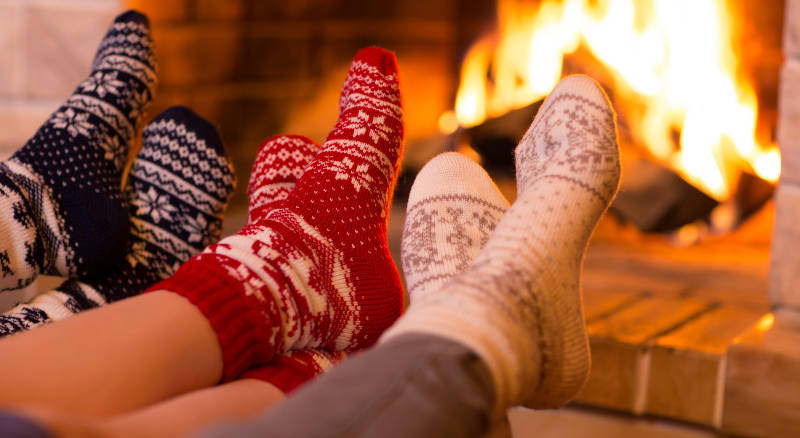Last updated on January 29th, 2019
Are you having trouble meeting your holiday expectations? Do you become frustrated, disappointed, or even beat yourself up, thinking somehow everyone else must be better than you are at shopping, baking, gift wrapping or even relaxing?
Surveys by the American Psychological Association show that many people experience an increased amount of stress during the holiday season, a time that we want to experience more joy, peace, and happiness. Putting pressure on ourselves to achieve our holiday bliss, paradoxically puts more stress on us.
This past year has taught me a lot about being resilient. My husband and I were fortunate enough to take on small-scale remodeling projects in our home of 15 years. Much of the work my husband did himself, which I admire. While we were grateful to be able to do this, moving into a hotel for a week with two cats, who mostly hid and howled, was very stressful. When we moved back, it was into two rooms of our house, which now looked like a cross between an episode of “The Hoarders” with stuff stacked up to the ceiling and “The Grinch Who Stole Christmas,” complete with nails on the walls and no pictures.
Initially I was distressed that I would not be able to decorate our home “as usual,” that there were no baseboards in several rooms, and that I still couldn’t find things. Fortunately, I was able to stop and pause. I reflected on what I want most during the holidays: meaningful connection with those I love and good food we can share! The things I value most were definitely possible.
While there is no silver bullet to becoming resilient and happy, the evidence-based strategies that I write and talk about work well for the holidays, too. We need only to remember to apply them!
So what are some of these strategies and how can you use them during the holidays?
- Chase Meaning Instead of Happiness
“Chase meaning instead of happiness,” as Stanford psychologist Kelly McGonigal likes to say. Think about what gives you meaning, purpose, and fulfillment, and make these things your priority. Consider the holiday traditions, the foods you like to prepare and share, or special religious services you look forward to attending and choose those that are most important to you and your family.
When you know what matters most, you can live with the things that will not get done without fretting or stressing.
- Make Self-care a Priority
Self-care may mean something different for you than it does for me or someone else. The critical point is that you identify the key activities and habits that help you to feel good, and stick with them. For some people, this means making sure you get a certain amount of sleep each night. For others, it’s the morning yoga or the walk with the dog that is essential.
Identify two to three habits that you will intentionally keep through the holiday season. Then, do them as best you can, letting go of perfectionism!
For me, one crucial habit is reading before bed. Depending upon the day, it may be a page, a chapter, or more, but it is the habit that helps me to know that I am not ignoring my own needs.
- Identify Ways You Can Be Kind and Generous Toward Others
When you do something helpful for someone else, whether it is to let someone into your lane on the highway or volunteer to help at your kids’ school, you receive numerous psychological and neurobiological benefits, such as good hormones and neurotransmitters, that are a direct result of behaving kindly toward others. Such choices make us happier.
Generous behavior toward others is also a great way to create a kinder, gentler world. There is robust research that shows that the “pay it forward” concept is very real. Your actions inspire others who become more likely to help someone else, who then become more likely as well to help others, creating a literal cascade of kindness and generosity. As Gandhi said, “Be the change you want to see in the world.”
- Gratitude is the Ultimate Resilience Strategy
Research suggests that adopting a gratitude practice of any kind expands your sense of well-being and happiness. There is no one size fits all or “right” way to express gratitude. Daily or weekly habits of gratitude—a blessing before a meal, a gratitude journal, or simply the daily intention to find something to be grateful for–soon result in a significant increase in well-being and happiness.
Moreover, if you are fortunate enough to have people you love in your life and more than enough to eat, you can feel thankful for these things. It serves no one to feel guilty that we have something that others don’t, but you CAN build your resilience and well-being by practicing gratitude and generosity.
- Focus on Experiences Versus Things
Research shows that you receive much greater happiness and satisfaction investing your money in experiences rather than things. When you spend money on an experience, such as travel to be with family, dinner, or theatre tickets, you have the experience of looking forward to the event itself, the actual experience, the memories, the sharing of the experience, and the photos you take. Experiences are the gifts that keep on giving.
Try these five proven strategies to increase your resilience and experience greater happiness this holiday season. Let me know if there are other strategies that you use that work for you.
Finally, if you are someone who has experienced a major loss or trauma this year, the above strategies can still help you create greater well-being and I recommend them. I would also add that you should throw the holiday “rule book” out the window altogether and claim your right to experience the holidays in ways that are truly in your best interest, letting go of others’ expectations.







I love all of these suggestions and I’m trying to practice each of them but I have to admit that #2 Make self-care a Priority is a favorite. All the others kind of flow out of that one for me. By focusing on gratitude, experiences and thinking of how to give to others in need, I feel self-cared for. I hope that makes sense. Thanks, Chris!